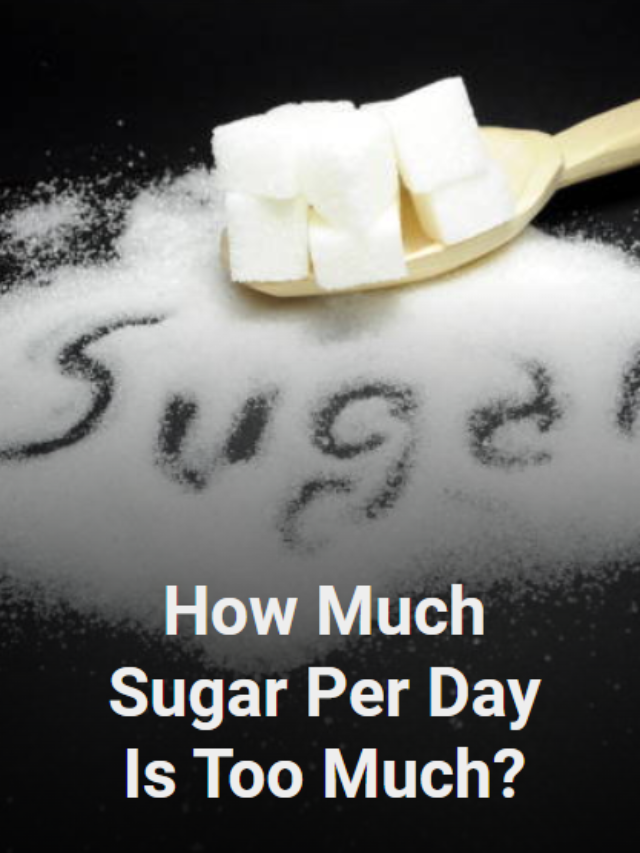How Much Sugar Per Day Is Too Much?
With so many demands in today’s fast-paced life, the question remains: How Much Sugar Per Day Is Too Much? This is evident in that sugar is in almost all the foods and beverages that we take including coffee, BBQ sauce, and some yogurts among others, making it very challenging to reduce our intake of sugars.
Understanding Sugar: Types and Sources

Sugar is a class of carbohydrates that is digested into glucose for energy purposes. However, those sugars are not the same and there is a difference between the bad and good sugars. There are two main categories of sugar: According to technological classification, there are two broad types of sugar.
1. Natural Sugars
These are sugars that are naturally and normally found in foods that include fruits, vegetables, and dairy products. These sugars are however accompanied by other nutrients such as vitamins, minerals, and fiber thus making it a better option. For example, fruits contain fructose which is a type of sugar; however, the fiber in fruits slows the rate at which sugar gets absorbed thus ensuring stable blood sugar.
2. Added Sugars
However, added sugars are sugars or syrups that are incorporated into other foods during the preparation of food or during the processing of food products. These sugars are energy-giving and do not have other compounds known to be essential in the body and are linked with various ailments. It ranges from table sugar (Sucrose), high fructose corn syrup, honey, agave syrup etc., are some of the examples.
The issue is – the sugars in foods and beverages, which we take irrespective of whether it is cereal, carbonated drinks, cookies, candies, or even snack bars, yogurt with fruit.
How Much Sugar Per Day Is Too Much?
According to the American Heart Association (AHA), the recommended daily intake of added sugars should not exceed:
For men: 1 tablespoon or 12 grams or 45 calories of sugar per day in the case of adults and 1 teaspoon or 4. 2 grams or 15 calories of sugar per day in case of children.
For women: Six grams or 6 teaspoons or 1000 mgs or 100 Kcals each day.
For children: Age-dependent 12-25 grams or about 3-6 teaspoons depending on our calorie intake per day.
However, people go beyond these limits and the average consumer in America consumes roughly 77 grams of sugar in a day; this is way above the daily recommended 25 grams of sugar per woman.
Sugar Content in Popular Foods
To understand how easy it is to surpass the daily recommended limit, consider the following examples: Now, let us observe that it is relatively easy to exceed PA daily dose by using the following examples:

For instance, a 375ml tin of Coke has nearly 39g of sugar in it, and that is if it is to be consumed in moderation the consequences of which could be detrimental to an individual’s health.
For instance, a flavored yogurt can consist of 20 grams of sugar.
It will shock you to realize that a small candy bar you take can have up to 30g of sugar.
For instance, using the kcal as a guide, you can see that even if you take a few of such products, you will exceed the recommended daily amount.
Health Risks of Consuming Too Much Sugar
According to the information above, it is clear that taking high levels of sugar in the daily diet has been proven to have severe vices on the body. Some of the major risks include: The following are some of the largest risks:
1. Weight Gain and Obesity
Extra sugar causes intake of more calories that are not healthy for the body as they do not possess nutritional values. Beverages and foods rich in sugars can make a person hungrier and have more cravings and therefore take a lot of food to fill consequently increasing the odds of obesity. Recent studies also indicate that sugary products are the worst because they do not have the feeling that one is satiated hence taking more calories than needed.
2. Increased Risk of Heart Disease
Excessive use of sugars increases the risk of heart problems. Excessive intake of sugar is likely to increase blood pressure, boost inflammation levels, and even increase the level of LDL cholesterol. And most of these conditions increase one’s chances of getting cardiovascular diseases.
3. Type 2 Diabetes

The consumption of foods heavily loaded with sugar would cause unhealthy levels of insulin to be produced which in turn causes type 2 diabetes. They found out that, consuming large quantities of sugar regularly raises blood sugar levels and consequently insulin is produced excessively by the pancreas. Lastly, insulin production reduces and your body is made resistant to insulin hence promoting high blood sugar levels and type 2 diabetes.
YOU MAY ALSO LIKE: Diabetes Type 2 Diet: Unlocking the Power of Nutrition
4. Increased Risk of Cancer
The consumption of sugars has been linked to some form of cancer, this research finding for instance indicates that. This is mainly because sugar triggers inflammation of the body tissues which increases the rate of growth of cancerous cells. In the same way, consumption of sugar leads to obesity and this is a known risk factor for many cancers.
5. Tooth Decay
Sugar is to blame for tooth decay, for which more than 64% of people suffer from cavities. In your mouth, bacteria will act on sugar and release acids that cause destruction of tooth enamel hence leading to the formation of cavities and other related oral health complications. This should be worrying particularly to children who frequently take snacks and drinks high in sugar content.
How to Reduce Your Sugar Intake
Lowering your consumption of sugar has a passel of health benefits that range from losing weight to increased energy, and decreased rate of health complications. Here are some effective strategies to cut back on sugar: Here are some effective strategies to cut back on sugar:
1. Read Food Labels Carefully
While eating processed foods, one should be careful and read the nutritional information label to know the amount of sugar that has been added to the food. Other added sugars are also sugars include sucrose, high-fructose corn syrup, glucose, and dextrose. Products with any kind of sugar in the first couple of ingredients are guaranteed to be sugary.
2. Choose Whole, Unprocessed Foods
Certain methods need to be adopted to reduce the intake of sugar, and the most recommended method is increased consumption of whole, raw, and unrefined foods. Lean meats, fish, nuts, legumes, fruits, and vegetables contain little or no added sugars as they are naturally occurring foods. Cooking your own meals also helps you regulate the amounts of sugar that are in your food.
3. Limit Sugary Beverages
Soda, energy drinks, and tea are the major consumers of added sugars in contemporary society. Replace these with healthier options such as water, unsweetened tea, or even sparkling water with a twist of lemon or lime.
4. Be Mindful of “Healthy” Foods

Low-fat or ‘enhanced’ foods are usually filled with a large measure of sugar to make them acceptable to the consumers. This means that snacks such as flavored yogurts, granola bars, and smoothies which are easily marketed as healthy snacks may contain lots of hidden sugars. In a case where it is possible, it is advisable to settle for unsweetened brands.
5. Reduce Sugar Gradually
You don’t have to pull sugar out of your life completely and avoid its intake at all costs. It is an effective strategy because it is easier to reduce the intake of sugar gradually than suddenly. After all, our taste buds change gradually. Foods such as candies, pastries, and sweets that you once consumed may taste too sweet while eating other foods such as fruits and vegetables may be too bitter.
Hidden Sources of Sugar
They have also found out that sugar is added to foods that do not have a sweet taste. Here are some common culprits: Here are some common culprits:
Ketchup: Clocks in with approximately 4 grams of sugar for every tablespoon of the spread.
Barbecue sauce: May have as much as 6 to 8 grams of the sweetening agent known as sugar in each tablespoon.
Salad dressings: The dressings usually contain sugars because the fats have been eliminated from many of the commercial dressings.
Bread: Most breads have extra sugar mixed in the dough to get better texture and taste.
Pasta sauce: Commercially prepared pasta sauce barely measuring half cup has a sugar content ranging from 6 to 12 grams.
Table: Sugar Content in Common Foods
| Food Item | Serving Size | Sugar Content (grams) |
|---|---|---|
| Soft Drink | 12 oz | 39 |
| Flavored Yogurt | 6 oz | 20 |
| Candy Bar | 1 bar | 30 |
| Ketchup | 1 tbsp | 4 |
| Breakfast Cereal | 1 cup | 10-20 |
| Pasta Sauce | 1/2 cup | 6-12 |
| Barbecue Sauce | 1 tbsp | 6-8 |
The Benefits of Reducing Sugar Intake
Many health benefits are associated with the reduction of your daily sugar intake. These include:
1. Better Weight Management
Eliminating sugar makes it simpler to weigh less because the number of calories taken is few as compared to when many are consumed. Because sugar leads to fat accumulation and hunger stimulation, reduction in the use of added sugar assists in controlling appetite and avoiding excessive food intake.
2. Improved Heart Health
Reducing the intake of sugar is known to lessen the chances of heart disease because it has an impact on reducing cholesterol, blood pressure, and inflammation.
3. Stabilized Blood Sugar Levels
Reducing the quantity of sugar you take makes your body experience minimal fluctuations in blood sugar levels thus preventing the onset of insulin resistance and type 2 diabetes.
4. Increased Energy Levels
Sugary foods mean the body doesn’t get its required nutrients hence causing the energy fluctuation after a short period of feeling energetic. Cutting on the consumption of sugar and increasing the intake of whole foods will in the long run make you have a constant energy.
5. Improved Dental Health
Reducing sweets reduces the chances of getting cavities, tooth decay, and other related oral complications. Whole foods such as vegetables and dairy products can also protect the teeth when more of them are included in one’s diet.
Conclusion
So, how much sugar per day is too much? For most adults, the recommended limit is between 25 and 36 grams of added sugar per day. Still, it’s easy to go over this amount without noticing it due to the concealed sugars that come with processed food. It has been established that one can be able to cut down their sugar intake as well as improve their health by reading food labels, taking whole foods, and avoiding sugary products. Reducing the intake of sugar is also important in slimming down besides avoiding the development of diseases such as heart disease, diabetes, and even cancer.
FAQs:
1. What happens if I consume too much sugar in a day?
Sugar consumption can also cause different health conditions such as obesity and being at risk of cardiovascular diseases, insulin intolerance, type 2 diabetes, and some types of cancer. It can also lead to sudden energy dips, unpredictable emotional outbursts, and inflammation of the gum or teeth leading to cavity or tooth decay.
2. Is natural sugar in fruits as harmful as added sugar?
No, even though natural sugar comes with added sugars it is as dangerous because fruits also have other nutrients such as fiber vitamins, and minerals. The fiber, vitamins, antioxidants, and healthy carbohydrates in fruits are absorbed slowly in the body thus increasing the energy release throughout the day. However, drinking fruit juices which contain no fiber can still cause a sugar overdose.
3. How can I reduce my daily sugar intake without feeling deprived?
The first step towards reducing the intake of sugars is to begin by reducing the number of sugary products that an individual consumes and replacing them with healthier products like fruits, water, and refined cereals. In making food choices the labels must be checked to ensure that no sugars were added and where possible use natural sweeteners such as stevia or monk fruit. Eventually, the preference of the taste will change, and a person will not have the desire to consume such products containing sugar.




